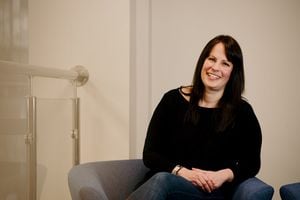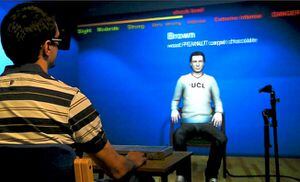Milgram experiment: Shropshire academic plays major role in updating world-famous electric shock research
“We were only following orders” – it was the defence used by many Nazis in the wake of the Holocaust, and appeared to be backed up by a famous experiment.

But now a new study involving a local academic has cast a new light on the Milgram electric shock experiments, which stunned the world.
American academic Dr Stanley Milgram’s study saw participants instructed to give electric shocks to subjects who made errors on a memory test.
The shocks were fake, although those administering them did not know that at the time. The results of the tests suggested people will inflict pain on others under instruction, because they are so focussed on doing what is asked of them that they are hardly aware of the consequences of their actions.
Yale-based Dr Milgram’s study and its findings are now widely studied by psychology students around the world, and suggested that many of those who participated in 20th century atrocities only did so under instruction.
But Dr Megan Birney, a senior lecturer in applied psychology at the University Centre Shrewsbury, has worked on a study that goes against some of these long-established findings.
“The Milgram obedience studies are some of the most famous that have been done,” says Dr Birney, who also lives in Shrewsbury.

“He told participants it was a study on teaching and learning and they were told there would be another participant in another room and they would have to read some word pairings to that participant, and if they were to get it wrong they were to administer an electric shock.
“The majority of them went all the way and gave a lethal shock which would have killed the person. This shocked the world.”
Dr Birney believes that Milgram was influenced by world events at the time, including the trial of Holocaust architect Adolf Eichmann.
“He famously described the idea that anyone and everyone could take part in this horrific event,” she said. “We think Milgram was influenced by this.
“He was very keen to find out what happened and understand World War Two and the Holocaust the best he could and that motivated him to design the study he did.”
Milgram wrote that people go into a state in which they will blindly do as they are told.
“You see this used all over the place, in court systems, records from war criminals, and it’s been used as an excuse,” says Dr Birney.
“What we have found through our research is that actually this is not what is happening at all.”
Along with colleagues from University of St Andrews, University of Barcelona, University of Queensland and University College London, the new study attempted to modernise the experiments.
Using a virtual reality replication of the originals, it shows that people are aware of the ‘learner’ and that they actively seek to help them avoid ‘shocks’ by emphasising the correct answers to the memory task.

However, if errors are still made, they continue to obey instructions to the extent that they administer the shocks.
“People don’t blindly follow orders at all,” said Dr Birney. “Imagine your boss says you ‘have’ to do something. You wouldn’t like that. You might do it but you wouldn’t do it willingly. If they said ‘we’ need to do this as it’s good for the organisation as a whole then you’ll be much more likely to do that.
“If you look at Hitler and how he orchestrated the Holocaust, there’s no orders, it started very small with the marking of Jewish people and slowly became what it became. It was never a case of ‘you have to do this’.”
Dr Birney says that Milgram’s findings actually show that during the three prompts to administer the electric shock, most people question their choice in the matter when they are told they ‘have to’.
“If you see the videos of Milgram’s studies the participants are distraught during this process,” said Dr Birney. “Obviously we couldn’t re-do Milgam’s study and we had to come up with different paradigms, and the one we chose used virtual reality.
“We do find we get people who go to the end but only because on some level they know it’s fake.
“We weren’t too concerned about how many people would shock the avatar, but what they would do in the process of shocking. Did they help the avatar? And they did. What we do find is that when they read out the word pairs they emphasis the correct word. People don’t like or want to shock the learner, they are trying to do the right thing.”
Dr Birney believes their findings, published in the publicly accessible journal Plos One, argue against Milgram’s study.
“It’s really important, because that is an excuse for people who have done some really horrible things, and we are saying this argument has to be dismantled and people have to take responsibility for their behaviour and actions,” she says.
“This argument has been so prevalent, and we are just saying we need to look at things differently. This is in now way trying to take away from Milgram or his work,but we are saying we can look at this in hindsight and can test it.”





